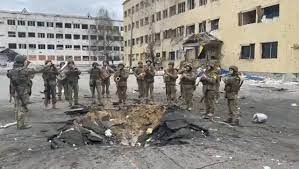It seems difficult in these times of pandemic, partisan divide, the rise of autocracies, income inequality, and racial divisiveness to even remember what hope used to mean. In America, we struggle even to hold accountable those who attempt to dismantle our democracy, those who devolve the U.S. into anocracy through manufactured disinformation, instill institutional distrust, tribalism, and stoke partisan division. Once an aspirational “shining city on the hill,” distrust and disillusionment are not only existential threats to the Union, but also an image unworthy of emulation. We can see the car speeding for the cliff edge and are often too self-absorbed and ambivalent to reach across the divide to do anything about it.
Across the Atlantic, our allies are engaged in the largest war on European soil since World War II, in an effort not to become the very thing our government careened toward with the last administration. And, possibly, the most inspirational message about the importance of democracy at a time in history when autocracy seems to be pervading the globe.
A 44-year-old ex-comedian is demonstrating to the world what leadership is, with honor and bravery and grace and humanity. He inspires his country (“The fight is here,” he responded to a U.S. offer to evacuate. “I need weapons. I don’t need a ride.”) and reminding a pandemic-numbed world that compassion and human rights are supposedly the hallmarks of democratic society. With daily tweets and videos on social media he reminds the world that democracy is a privilege that Ukrainians do not take lightly.

“I am shocked at the courage but also the humanity [the Ukrainians] are displaying,” said Jon Stewart. “They are not responding in hatred or anger, but in care.”
Volodmyr Zelensky has demonstrated extraordinary leadership, but so, too, has the rest of the country.
The former president, Victor Yanukovych, was speaking to MSNBC and noted that he was now taking up arms with a regiment of 300 volunteers. When asked how many weapons they had, he responded, “Seven.”
Checkpoints made of tires are being guarded by civilians with hammers and garden tools.
Kira Oleksandrivna Rudyk, a Ukrainian politician and current leader of the political party Voice and since 2019 a member of the Verkhovna Rada, tweeted, “I was going to plant tulips today. But I took lessons firing a gun instead. I will plant my flowers next week.”
A 70-year-old man was turned away from a volunteer center. “I’ll just come back the next day. And the next. Until they let me in.”
Ukrainian hackers Stand for Ukraine have built a 300,000-strong tech army with Anonymous.

Stewart remarked, “There is part of me that truly hopes, hopes, that is where the social media algorithm will shine. Boy, if anything can go viral, let it be this. Let it be these speeches. Let it be these moments. And let that, in some way, build momentum to end this.”
And those moments have gone viral: a young girl singing “Let it Go” (from Frozen) inside a bomb shelter, Ukrainian reservists marrying on the Kyiv front line as Russia closes in, the Ukrainian soldiers on Snake Island telling the Russian Moskva warship to “go f*** yourself” (see Editor’s Notes for full background of Snake Island).

In the face of nearly insurmountable odds, Ukraine holds its cities for one day, two days, three days, four days…to give its allies time to come to their aid, believing and trusting that the world democracies are not just bureaucratic relics fallen to rampant corporate consumerism, but real ideologies with people elected by the populace to public service, to represent their constituencies and homelands, not would-be oligarchs whose governments titles exist only line their pockets.
Zelenskyy reaches out to the International Court because he believes justice will prevail. He continues to the negotiating table recognizing all attempts at negotiation have failed so “not one Ukrainian will not know I tried to stop this war.” He speaks directly and plainly to the people of Belarus and Russia, knowing that the autocratic leaders are not beholden to their constituencies but with the glimmer of promise that what Ukraine has achieved in its 30 years of independence is an inspiration. In the decimation of cities and the prevalence of Russian war crimes, the Ukrainians refuse to relent and collect evidence for international justice to prevail.
Far from intimidating his neighbors, Vladimir Putin has strengthened democratic alliances, as Finland and Sweden petition for NATO membership.
As this issue goes to print more than 100 days into a conflict Putin expected to last less than 10, Ukraine has lost 20% of its land (including Crimea annexed in 2014) and suffered many causalities, but has lost absolutely none of its resilience. And President Zelenskyy resolves to recover independence, democracy and freedom for 100% of his nation.
Leave a Reply